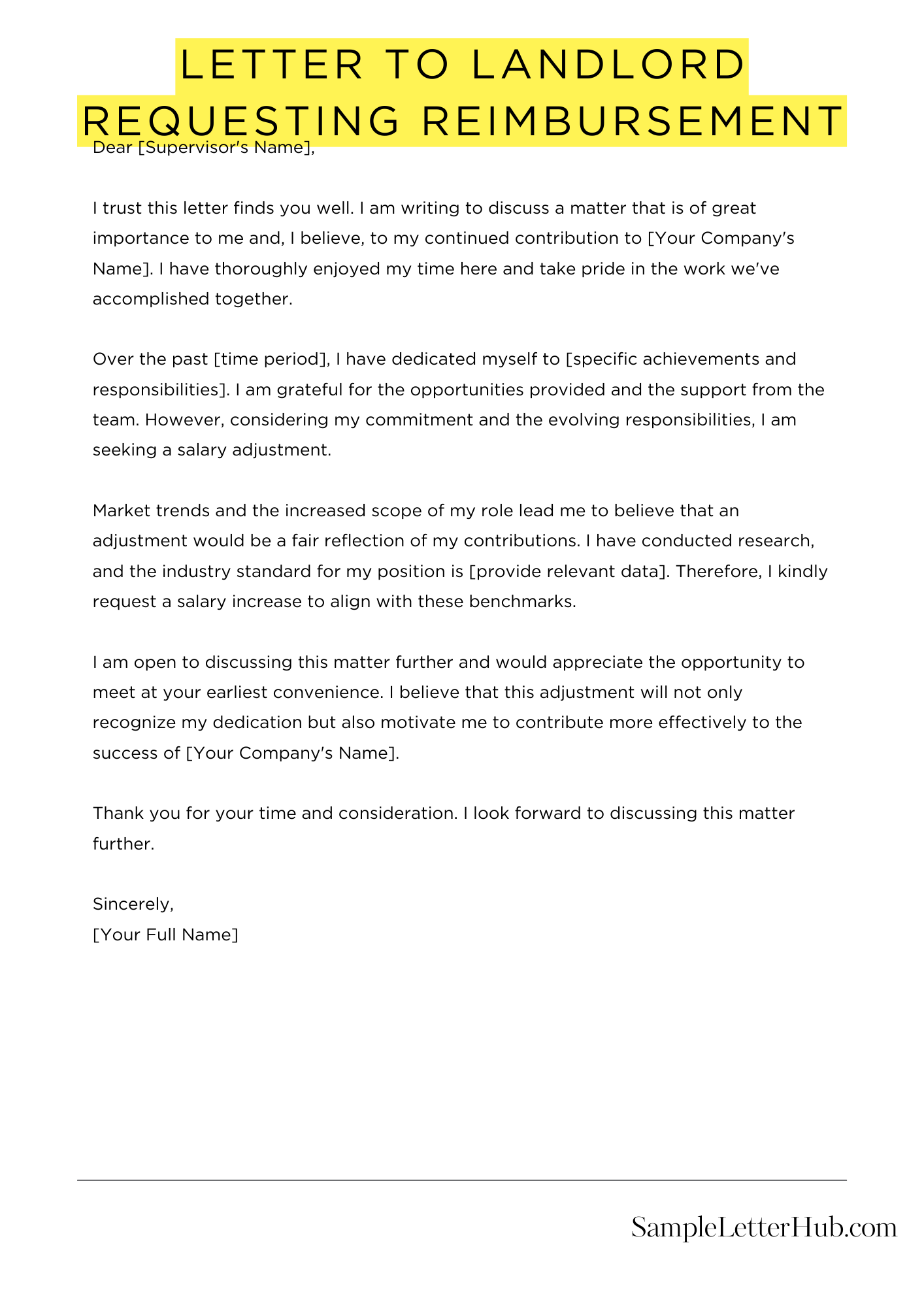A Letter To Landlord Requesting Reimbursement is a formal letter written by a tenant to their landlord, requesting reimbursement for expenses incurred by the tenant on behalf of the landlord or for repairs or improvements made to the rental property.
In this article, we will share templates, examples, and samples of Letter To Landlord Requesting Reimbursement. These samples will provide you with a starting point for drafting your own letter and ensure that your request is clear, concise, and professional.
Letter to Landlord Requesting Reimbursement
Dear [Landlord’s Name],
I am writing to request reimbursement for expenses incurred during my tenancy at [address]. As per our lease agreement, I am responsible for certain repairs and maintenance, but I believe the following expenses fall outside of my responsibilities.
Specifically, I am requesting reimbursement for the following:
* **[Expense 1]**
* **[Expense 2]**
* **[Expense 3]**
I have attached receipts and documentation to support my claims. The total amount I am requesting is [amount].
I understand that you have a busy schedule, but I would appreciate it if you could review my request and respond as soon as possible. I am available to meet with you to discuss this further at your convenience.
Thank you for your time and consideration.
Sincerely,
[Your Name]

How to Write Letter To Landlord Requesting Reimbursement
Writing a letter to your landlord requesting reimbursement can be a daunting task. However, by following a few simple steps, you can ensure that your letter is clear, concise, and persuasive.
1. Start with a Formal Salutation
Begin your letter with a formal salutation, such as “Dear Mr./Ms. Landlord.” If you do not know your landlord’s name, you can address the letter to “Landlord of [Property Address].”
2. State Your Request Clearly
In the first paragraph, clearly state your request for reimbursement. Be specific about the amount you are requesting and the reason for your request.
3. Provide Supporting Documentation
If you have any supporting documentation to back up your request, such as receipts or invoices, be sure to include copies with your letter.
4. Explain Your Situation
In the next paragraph, explain your situation in more detail. Be clear and concise, and avoid using jargon or technical terms.
5. Use Persuasive Language
Use persuasive language to support your request. Explain how the reimbursement would benefit you and/or the property.
6. Close with a Call to Action
In the final paragraph, close with a call to action. Ask your landlord to approve your request and provide you with a timeline for reimbursement.
7. Sign Your Letter
Sign your letter with your full name and contact information.
FAQs about Letter To Landlord Requesting Reimbursement
What are the most common reasons for requesting reimbursement from a landlord?
The most common reasons for requesting reimbursement from a landlord include repairs that the landlord is responsible for, such as fixing a broken appliance or repairing a leaky roof, and expenses incurred by the tenant on behalf of the landlord, such as paying for a pest control service or replacing a broken window.
What information should I include in a letter to my landlord requesting reimbursement?
When writing a letter to your landlord requesting reimbursement, be sure to include the following information: a detailed description of the expense, including the date it was incurred and the amount you are requesting; a copy of the receipt or invoice for the expense; and a statement explaining why you believe the landlord is responsible for the expense.
How should I format a letter to my landlord requesting reimbursement?
A letter to your landlord requesting reimbursement should be formal and polite. It should be typed or written legibly, and it should include your name, address, and contact information, as well as the date and the landlord’s name and address. The letter should be organized into paragraphs, and it should be proofread carefully before it is sent.
What should I do if my landlord refuses to reimburse me?
If your landlord refuses to reimburse you for an expense that you believe they are responsible for, you may want to consider taking the following steps: contacting your local housing authority or tenant’s rights organization for advice; filing a complaint with the landlord-tenant board in your area; or taking legal action.
Can I request reimbursement for repairs that I made myself?
In most cases, you cannot request reimbursement for repairs that you made yourself unless you have the landlord’s prior approval. However, there may be some exceptions to this rule, such as if the repairs were necessary to prevent further damage to the property or if the landlord was unresponsive to your requests for repairs.

